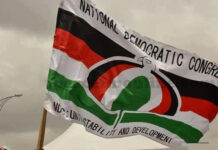
As President Akufo-Addo gets set to address Parliament this morning on the State of the Nation, policy think-tank IMANI has been looking at areas his address should focus on.
Below is the full statement:
Promising a host of social, political, and economic reforms to deliver jobs and revive industry while protecting the poor and vulnerable, the current government won the hearts of many Ghanaians. In line with his constitutional duty, the President will present his first State of the Nations Address, to provide details about the state of affairs of the country as he inherited and then attempt to provide the plank for the design and implementation of policy programmes and interventions to achieve his party’s promises.
IMANI, at the barest minimum, expect clarity on issues related to the economy, energy, education, healthcare and governance
(i) ECONOMY
Having plummeted in the last 5 years (using any known macro-economic aggregate), the economy appeared to have started experiencing some marginal rebalancing and repositioning for growth (comparing results of 2014 through to 2016), with strong headwinds still posing threats from the power sector, debt sustainability, revenue mobilisation, unsustainable expenditure patterns, savings in the economy, price stability and corresponding effects on income, and currency instability. No economy can sustainably provide the social, political and cultural public and private goods if the economy is not working. The expectation therefore is for the presentation by the President to provide the real context and performance of the economy along these sound economic measurement indicators. Citizens can only see the potency of the government’s ability to deliver on social, political and cultural promises if the basics (economy) is right. The presentation should highlight the current state of the economy, where the government intends to take it [economy] to in the next 4 years, focusing on strategies for the year 2017, and crucially the summary of key performance indicators that the government should be held accountable to, within the VERY short term and over its possible medium term plan.
ENERGY
A key component of the economic recovery strategy is the recovery of the power sector to supply sustainable and affordable power to the individual and corporate consumers. By 2012, the generation capacity was estimated at 1,800MW and as at 2015 it increased to 2,812MW. Over this same period, the country experienced one of its worse power crises. Notably, in spite of increases in generation capacity, the power crisis was not abated at the expected rate. Inadvertently, this is due to the fact that the approach to solving the power crisis in Ghana has so far focused on expanding generation without corresponding effort to ameliorate other pressing issues, particularly addressing inefficiencies in transmission and distribution as well as huge indebtedness of the power utilities. It is expected that the 2017 State of the Nation’s address will touch on the means through which the new government purports to address this problem in order to effectively break the recurrent cycle of power crises. Also of keen interest will be the strategy of the new government to deal with the Millennium Development Authority’s Ghana Power Compact that proposes the ECG Financial and Operational Turnaround which ECG has constantly opposed without economic justification leading to delays in its implementation.
The expected strategies for the current and subsequent fiscal periods for generating revenue from the petroleum sector and for insulating project delivery given the dwindling allocations to the ABFA will also provide sufficient clarity into the productivity and supply chain issues around the sector.
(ii) EDUCATION
There is no denying that the conversation around education will focus on the proposed ‘free senior high school’ policy prescription which has taken centre stage over the last couple of days, following from the President’s own presentation sometime last week in the Eastern Region. He had given the clearest indication yet of the nature and extent of the promise. The absence of sufficient clarity on financing from government and officialdom even after the President’s comments, has resulted in the general public making assumptions which underlie the diverse plausible implementation strategies for the policy. The presentation by the President should present an opportunity to bring clarity and context to the policy, by appraising the nation of the state of education ,the expectations of the labour market, vision for the labour market and how it ties in with the structure and form of education, senior high school education as it stands against other policy prescriptions evinced in the run up to elections; training of teachers, allowances and motivation of teachers, increment in teacher trainees, strategies for improving quality, and infrastructure expansion. Ultimately funding strategies for supporting the sector will be critical. This is without prejudice to the presentation of the budget and economic management plan by the Minister of Finance due in March 2017.
HEALTHCARE
Closely linked to the economy and education is the health sector; the health of the nation is its wealth. It is expected that the President will provide in clear terms his vision for the sector, and the corresponding strategies for addressing some of the most contentious issues confronting the sector including infrastructure, democratisation of affordable healthcare, and a proper functioning national health insurance scheme. Crucially, a reconciliation between possible tax strategies for managing the economy and the possible trade-offs in funding for the national health insurance scheme require the President’s attention, and we expect substantial clarity on the subject.
GOVERNANCE
The new government again rode to victory on the back of a strong commitment to fighting corruption, and deepening citizens’ participation in governance. Ranging from district level elections to the institutionalisation of a special public prosecutor, through to decentralisation of the government machinery for delivery of public goods and services, a myriad of commitments has been made by the government. It is expected that some clarity will be brought to the actual implementation strategies behind these broad commitments, and the possible forward and backward linkages that could be fostered between these initiatives and others such as the district industrialisation drive, expected key performance indicators for the 2017 to 2020 period. Crucially the possible strategies to be adopted via the ubiquitous technological systems to drive citizens’ participation in governance via accountability and transparency will be critical points which the President will be expected to address.
These should set the tone for proper stakeholder engagement between the government and citizens to further re-enforce the need for the machinery of government to understand, visualise, effectively communicate strategy for diagnosing and solving the socio-economic problems confronting the country. IMANI will provide a full review and assessment of the presentation by the president within time, to engender proper contextual conversations around the emerging themes going forward
Franklin Cudjoe
Founding President & CEO, IMANI




